Phd Application Letter
Dear [Admissions Committee/Professor],
I am writing to express my strong interest in pursuing a Ph.D. in [Field of Study] at [University Name]. As a highly motivated and enthusiastic individual with a passion for research, I am confident that pursuing a Ph.D. at [University Name] will provide me with the ideal platform to pursue my academic and professional aspirations.
I completed my undergraduate studies in [Field of Study] at [University Name], where I was able to develop a strong foundation in [key skills and concepts]. During my studies, I was fortunate to have the opportunity to work closely with [name of professor or researcher] on a research project that focused on [brief description of research project]. This experience ignited my passion for research and inspired me to pursue a Ph.D. to further explore [specific research interest or area of focus].
After completing my undergraduate degree, I gained valuable experience as a [position] at [company/institution], where I was able to apply the skills and knowledge I had acquired during my studies. However, I have come to realize that my true calling is in research, and I am eager to return to academia to pursue a Ph.D.
I have researched [University Name] extensively and am impressed with the cutting-edge research being conducted by the faculty and the innovative programs and resources available to students. I am particularly drawn to [specific research interest or area of focus] and am excited about the opportunity to work with the distinguished faculty in this field.
Thank you for considering my application to the Ph.D. program at [University Name]. I am confident that pursuing a Ph.D. at [University Name] will provide me with the academic rigor, research opportunities, and professional development that will enable me to achieve my career goals. I look forward to the opportunity to contribute to the academic community at [University Name] and to learning from the esteemed faculty and fellow students.
Sincerely,
[Your Name]
Formal PhD Application Letter
Subject: Application for PhD Program in [Field]
Dear [Professor/Admissions Committee],
I am writing to express my interest in applying for the PhD program in [Field] at [University Name]. I have completed my [Master’s Degree] in [Subject] from [University], and my research interests align closely with the work of [Professor Name/Research Group].
Enclosed are my CV, transcripts, and research proposal for your consideration. I am eager to contribute to ongoing research and pursue advanced studies under your guidance.
Thank you for considering my application. I look forward to the opportunity to discuss my candidacy.
Sincerely,
[Your Name]
[Contact Information]
Casual PhD Application Email
Hi [Professor Name],
I hope this message finds you well. I am writing to express my interest in joining your research group for a PhD in [Field] at [University Name]. My background includes a [Master’s Degree] in [Subject], and I am particularly interested in [Specific Topic/Project].
I have attached my CV and research proposal for your review. I would be grateful for the opportunity to discuss my application further.
Thank you for your time and consideration.
Best regards,
[Your Name]
[Contact Information]
Heartfelt PhD Application Letter
Dear [Admissions Committee/Professor Name],
It is with great enthusiasm that I submit my application for the PhD program in [Field] at [University Name]. My academic journey in [Subject] has fostered a strong passion for [Research Topic], and I am inspired by the pioneering work being conducted at your institution.
I am confident that my skills and dedication will allow me to contribute meaningfully to your research community. Enclosed are my CV, transcripts, and research proposal.
Thank you for considering my application. I would be honored to join your program and pursue my research ambitions under your mentorship.
Sincerely,
[Your Name]
[Contact Information]
Provisional/Preliminary PhD Application Letter
Subject: Preliminary Application for PhD Program
Dear [Professor/Admissions Committee],
I am writing to submit a preliminary application for the PhD program in [Field] at [University Name]. I am currently completing my [Master’s Degree] in [Subject] and am in the process of finalizing my research proposal.
I am very interested in [Research Topic/Project] and would be grateful for your initial feedback on my application and research direction.
Thank you for your time and consideration. I look forward to your guidance.
Sincerely,
[Your Name]
[Contact Information]
What a PhD Application Letter Is and Why It’s Important
A PhD application letter is a formal document submitted to a university or a professor expressing interest in a doctoral program.
Purpose:
- Introduce the applicant and summarize academic background
- Highlight research interests and alignment with faculty
- Present qualifications and readiness for doctoral-level research
- Demonstrate motivation, professionalism, and communication skills
Who Should Write a PhD Application Letter
- Prospective PhD students
- Researchers seeking to join a faculty lab or research group
- Professionals with relevant academic or research experience
Whom a PhD Application Letter Should Be Addressed To
- Admissions committees of universities
- Professors or potential PhD supervisors
- Research coordinators in specialized programs
When to Send a PhD Application Letter
- Ahead of application deadlines for PhD programs
- When contacting potential supervisors for research alignment
- Before submitting supporting documents like research proposals and CVs
How to Write a Strong PhD Application Letter
- Begin with a clear subject line
- Introduce yourself and summarize academic qualifications
- State your research interests and potential fit with the program
- Mention any relevant publications, projects, or experiences
- Attach supporting documents: CV, transcripts, research proposal
- Maintain a professional, concise, and clear tone
- End with gratitude and a formal closing
Formatting Guidelines for PhD Application Letters
- Length: 1 page or 300–500 words
- Tone: formal, professional, or occasionally heartfelt
- Include all essential information: academic background, research interests, and contact info
- Ensure correct spelling of university, faculty, and program names
- Use a professional font and clear formatting if submitted digitally
Tricks and Tips for PhD Application Letters
- Research the professor or program thoroughly
- Tailor each letter to the specific program or faculty
- Highlight unique skills or experience relevant to research
- Attach a concise research proposal
- Proofread carefully to avoid errors
Common Mistakes in PhD Application Letters
- Being too generic or using a template without customization
- Ignoring the professor’s or department’s research focus
- Writing a letter that is too long or disorganized
- Failing to attach necessary documents
- Spelling errors and incorrect academic titles
After Sending / Follow-up for PhD Application Letters
- Confirm receipt of the application if possible
- Send a polite follow-up email after 2–3 weeks if no response
- Prepare for potential interviews or further document requests
- Maintain professional communication throughout
Pros and Cons of Sending a PhD Application Letter
Pros:
- Establishes initial contact with faculty
- Demonstrates initiative and professionalism
- Can improve chances of being noticed in competitive programs
Cons:
- Requires careful customization and research
- May need multiple follow-ups for response
- Mistakes can negatively impact perception
Compare and Contrast: PhD Application Letter vs. Standard University Application
- PhD letter: personalized, research-focused, sent to a specific professor or committee
- Standard application: general, often via an online portal
- PhD letter emphasizes research fit and prior experience, whereas standard applications emphasize eligibility and grades
Elements and Structure of a PhD Application Letter
- Subject line
- Salutation (Professor/Committee)
- Introduction: academic background and purpose of letter
- Research interests and alignment with program
- Relevant qualifications, projects, or publications
- Attachments list (CV, transcripts, research proposal)
- Closing statement with gratitude
- Signature and contact information
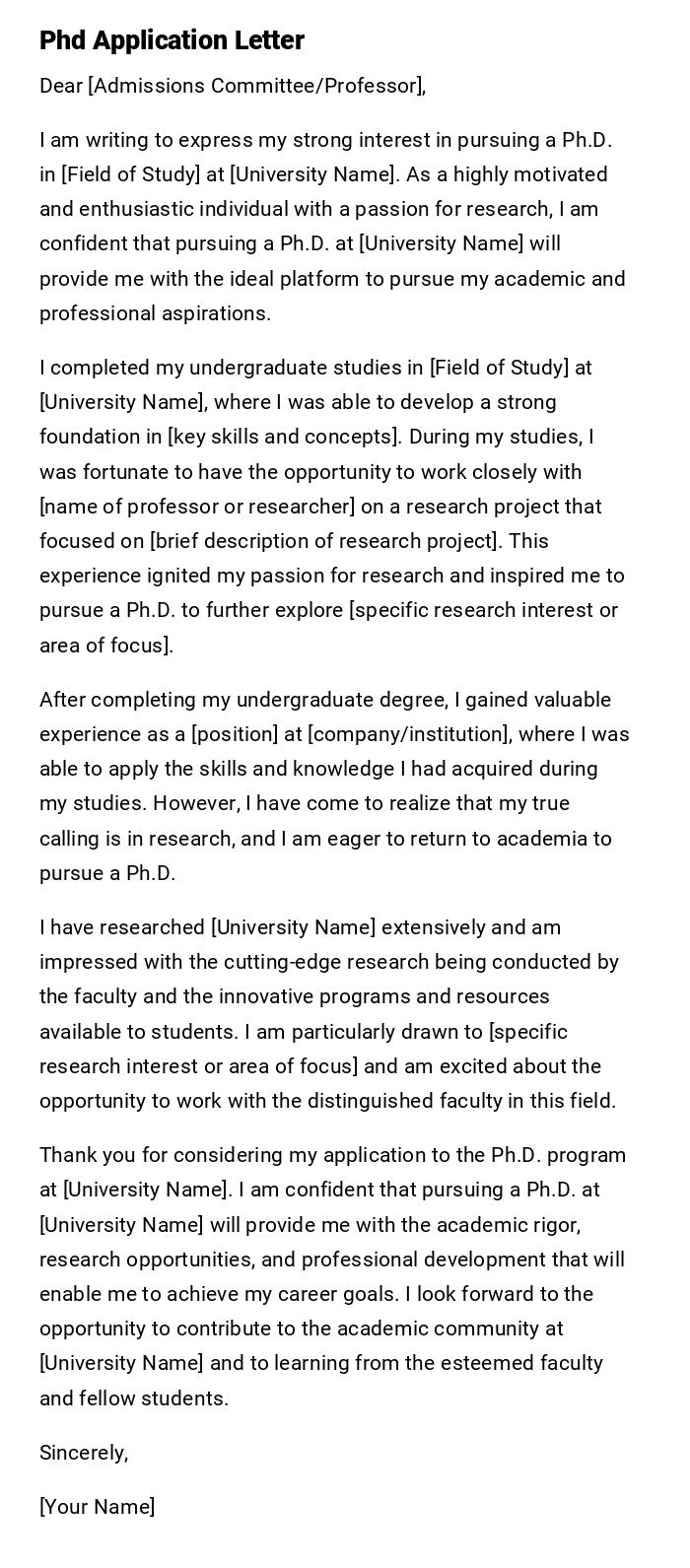
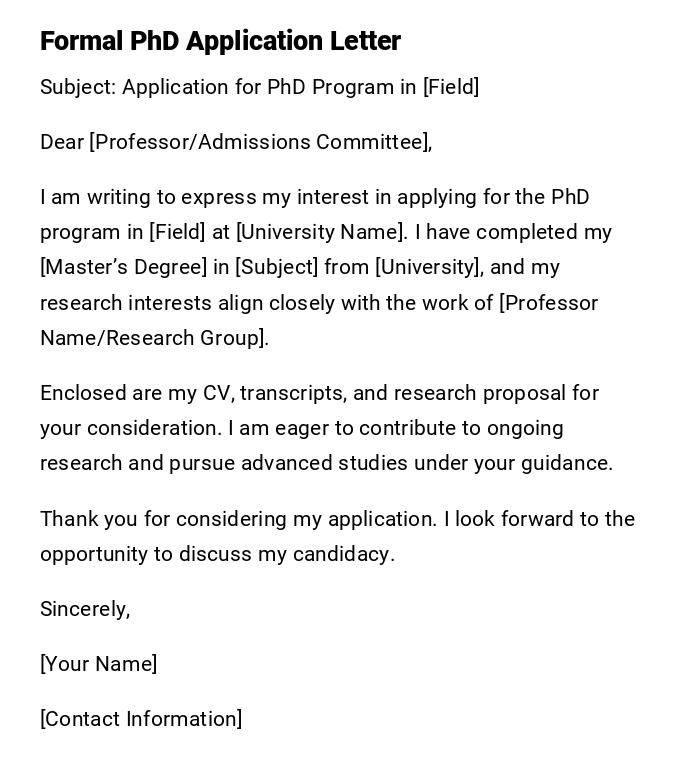
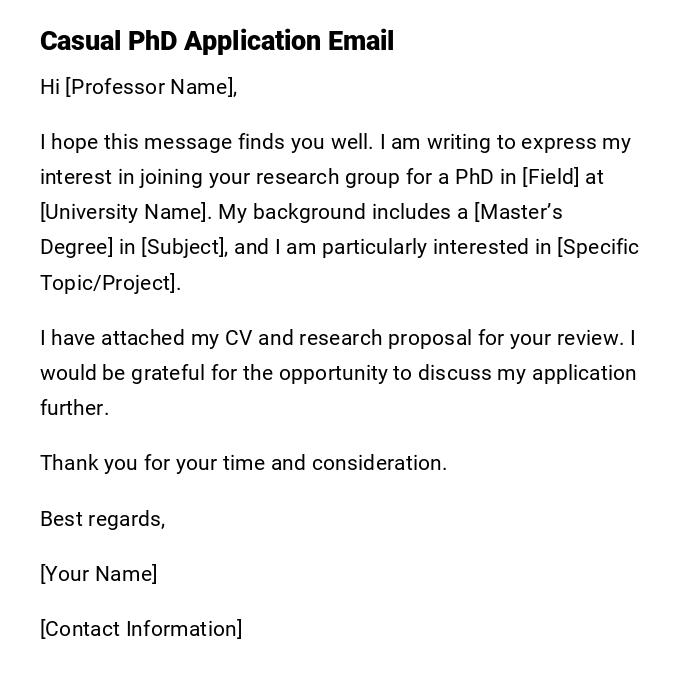
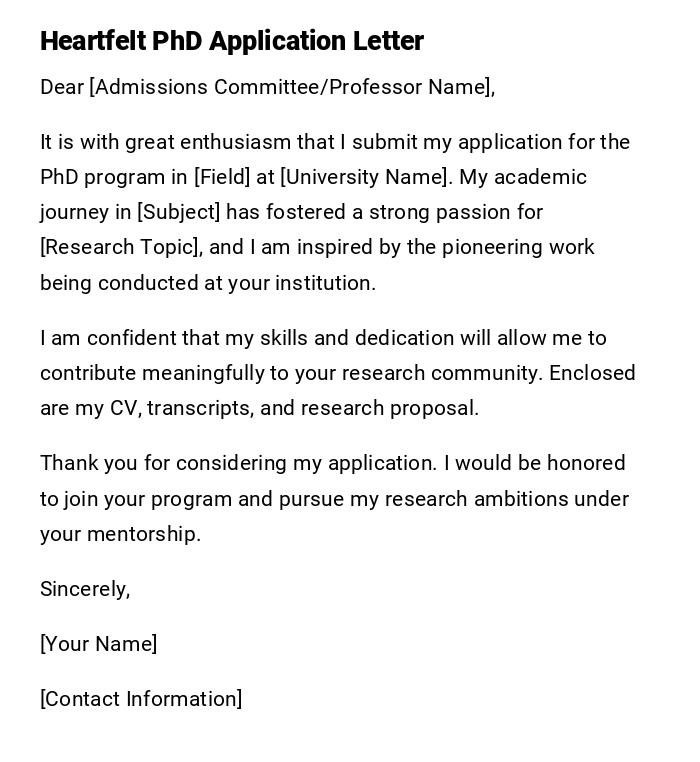
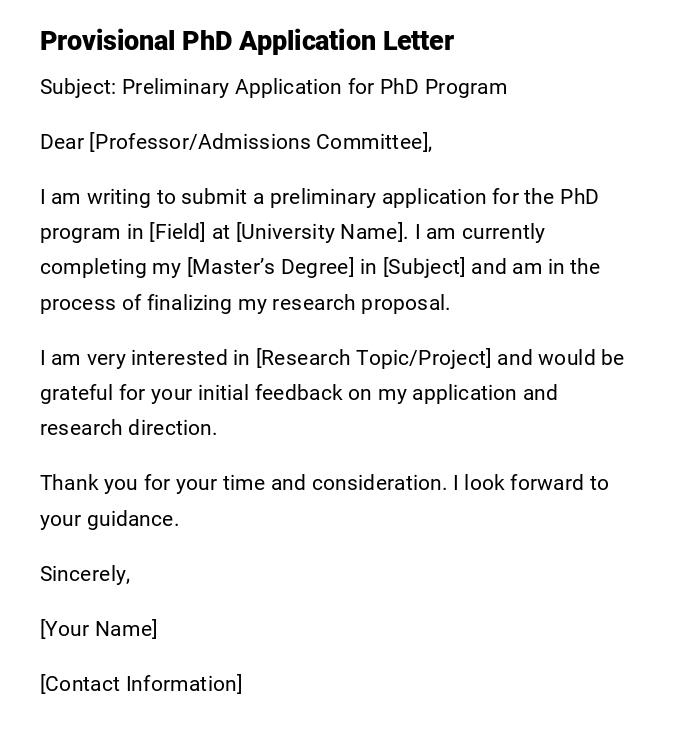

 Download Word Doc
Download Word Doc
 Download PDF
Download PDF